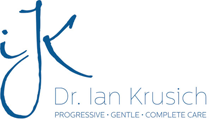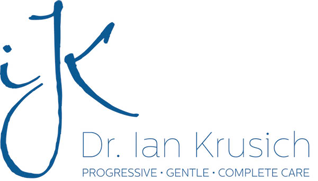What are Veneers?
Dental veneers are thin porcelain or resin shells that are bonded to the front side of your existing teeth. Veneers reshape, recolor, and restore your smile and confidence by giving you that perfect, natural looking smile. Veneers are a great solution for teeth that maybe chipped, discolored or stained, worn down, or used to fill-in spaces and gaps between teeth.
Veneers can be made of a resin material, similar to the material used in Composite Bondings, or made from porcelain. Dr. Krusich recommends porcelain veneers because they are harder, last longer, and resist stains better than resin veneers.
Advantages & Disadvantages of Dental Veneers
Advantages of Veneers
- Veneers quickly restore a natural looking smile.
- Porcelain veneers are durable and with the proper care, can last for 8-10 or more years.
- Veneers can be selected in different custom shades to properly match your natural teeth color. For this reason, if you are interested in tooth whitening, it is best to whiten your smile before trying to match a veneer shade.
Disadvantages of Veneers
- Veneers are non-reversible because a thin layer is removed from each existing tooth so the veneer shell fits properly.
- Because part of the tooth enamel is removed, teeth may become more sensitive to hot and cold food & beverages.
- Veneers can crack or chip from excessive force from biting finger nails, chewing on ice, grinding ones teeth at night, or even chewing on external objects like pencils.
- Should a veneer be damaged, the only recourse is to replace it.
What to Expect With Veneers
The process to apply veneers is relatively simple and is typically done in 2 or 3 appointments. With the exception of an external lab making the veneer, all the work is done by Dr. Krusich in our local office. Here’s a brief outline of what to expect:
- You and Dr. Krusich will meet so he clearly understands your objectives and to determine if veneers are right for you.
- If you both decide to proceed with dental veneers, Dr. Krusich’s assistant, will make a model of your teeth that can be shared with an external lab so they can create a mock-up before the prep date. This will give Dr. Krusich and the patient a clear picture of the desired result before any preparation of the teeth.
- Next, Dr. Krusich will prepare each tooth. This removes about a half-millimeter of the tooth’s surface so the veneer fits properly without being too bulky. Another impression is taken and sent to the lab for fabrication.
- Each veneer is fitted, trimmed, and adjusted by Dr. Krusich before being bonded to your tooth at the final appointment.
Insurance and Veneers
Veneers are usually considered “cosmetic” in nature and as such, are typically not covered by dental insurance. However, your insurance plan might be different. Dr. Krusich accepts most of the major dental insurance programs including Aetna, Cigna, and Delta Dental. It’s always best to have our insurance coordinator, contact your dental insurance carrier to determine your exact coverage so you know exactly what benefits you have.
While each case is different, veneers typically run between $800 to $1300 per tooth. But remember, each case is different and your situation maybe a little more or less. Dr. Krusich offers financing thru Care Credit and we have found their program to be ideal for patients interested in veneers. If you’re interested to learn more about financing options, speak with our office staff for more information.
Dental veneers should last for 7 or more years so this cost is really just a few dollars each month for that perfect smile that you desire.
Next Steps
The best thing to do is to ask Dr. Krusich, or even your hygienist about veneers the next time you’re in for an appointment. They can evaluate your unique situation and determine if veneers are appropriate for you. And if they are, a follow-up session can be scheduled with our front desk to begin your process.



